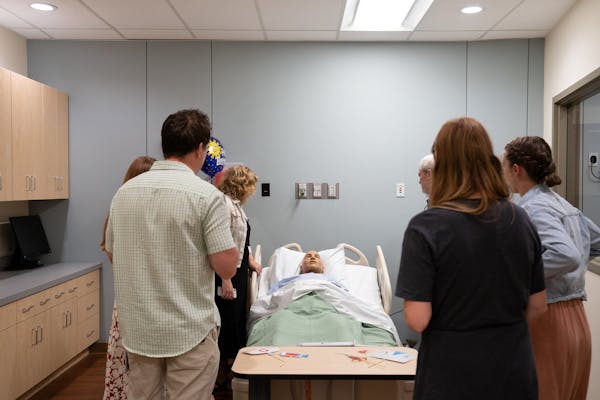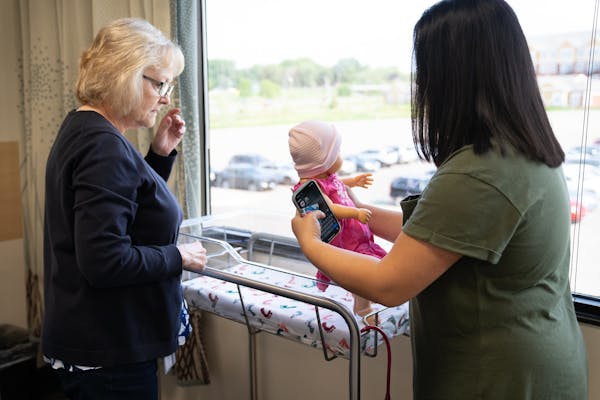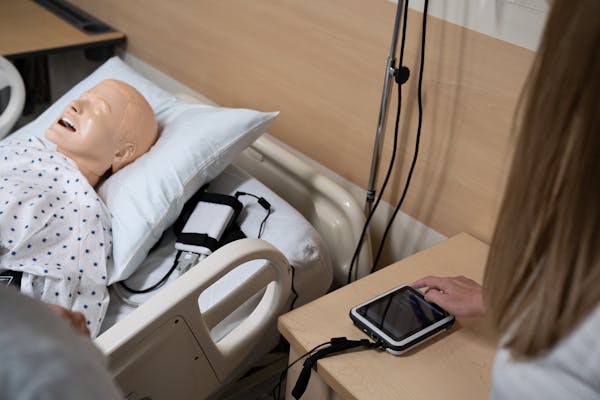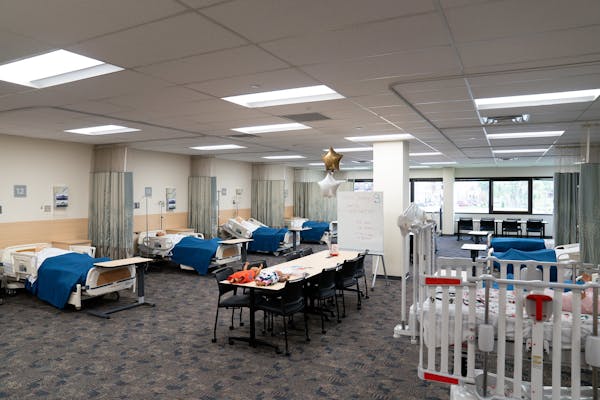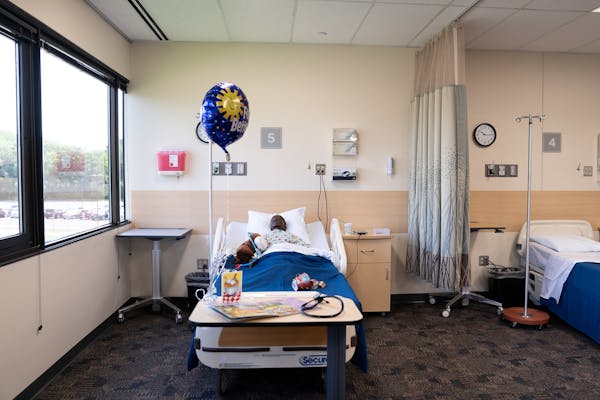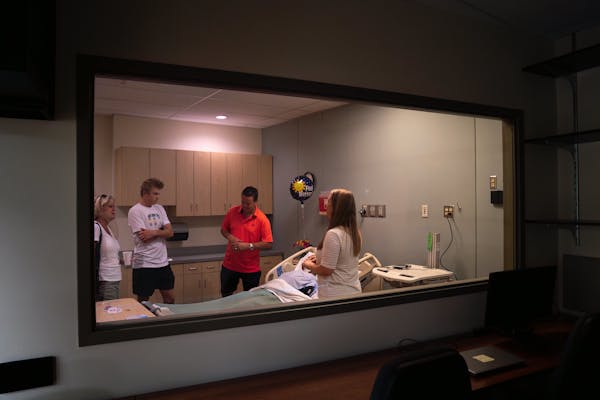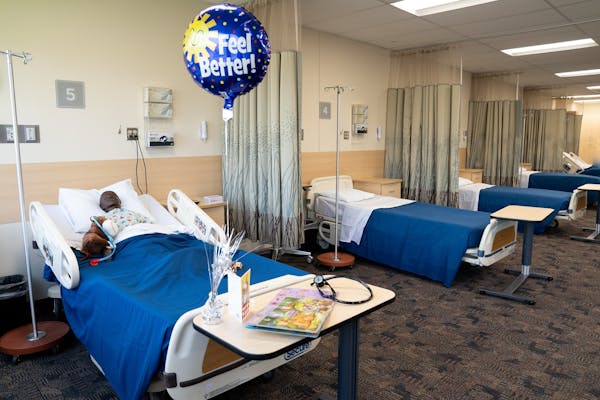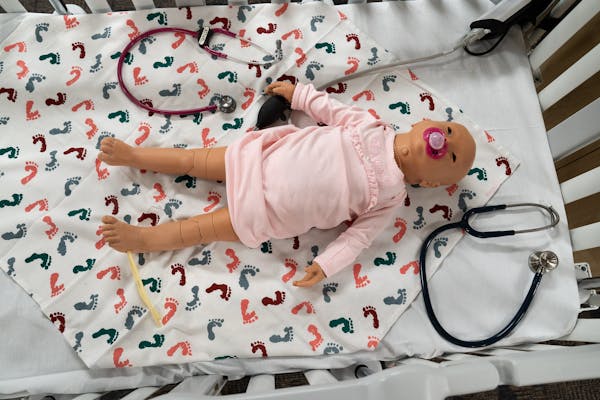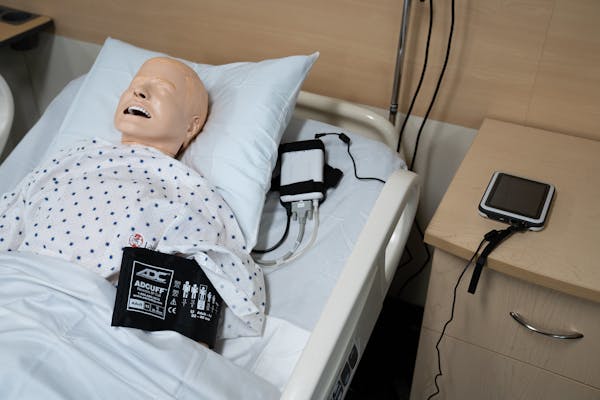Bethel’s New Post-Baccalaureate Nursing Lab Brings Key Training Space for Aspiring Nurses
By Jason Schoonover ’09, senior web content specialist
August 08, 2023 | 11:45 a.m.

Bethel’s Post-Baccalaureate Nursing program opened its space in early August to give students, partners, supply vendors, supporters, and Bethel community members a chance to see the news lab at Anderson Center.
Walking into Bethel’s new Post-Baccalaureate Nursing Lab, you might think you’re in a clinic or hospital. Lifelike manikins recline in hospital beds in the main skills lab with traditional hospital curtains, wall ports for oxygen, and bedside tables while the simulation room almost perfectly replicates a hospital room. Though no patients will receive care here, the labs are designed to be realistic to give aspiring nurses hands-on experience in everything from changing a dressing or hanging an IV to selecting supplies. “Skills intensives and simulation labs create a space where we can practice and perfect skills before we use them in the clinical setting,” says Sydney Gordon CAPS’24. “It is a space where often we make mistakes but try and learn from them.”
Like Gordon, Philip Norris ’23, CAPS’24 is also thrilled to be in the first cohort of students that will use Bethel’s new Post-Baccalaureate Nursing Lab at Bethel’s Anderson Center. “We are excited that this class will be the first to use it and set the foundation for the new area,” Norris says. The new space marks a significant step for Bethel’s post-bacc program, which offers an accelerated path to a Bachelor of Science in Nursing for students with a prior bachelor’s degree. Bethel launched the post-bacc program with 18 students in 2020 by sharing space with the undergraduate nursing program on the 3900 campus, which allowed the post-bacc program to build momentum. But to admit more students, the program needed its own space. The new space allows the program to grow and launch a second cohort, doubling the max number of students to 60 a year—36 in a summer cohort and 24 in a fall cohort. And Program Director Kristi Gustafson says they may eventually explore expanding even further. “The growth trend has been far more accelerated than what we initially thought when we were dreaming about the program,” Gustafson said.
Loading Gallery...
Post-Baccalaureate Nursing Lab
A donor who is passionate about healthcare provided funding to renovate the 5,585-square-foot lab on the fourth floor of the Anderson Center, which also houses Bethel Seminary, most graduate and adult programs, and several offices. Along with providing key space for hands-on learning, the new lab is designed specifically for adult learners. Post-bacc students start with online theory classes before taking skills courses, which are a hybrid of online instruction and in-person intensives in the nursing lab, which provide vital hands-on experience before students go on to gain over 500 hours of clinical time at partner clinics. The new space is split into two sections—the first is an open layout skills lab with 16 beds and the second includes the simulation suite, a control room, office space, and a debriefing room. Typically, students begin by working in groups of two on the skills side to practice key nursing skills—everything from the right type of ergonomics for patients to administering medicine, practicing things like wound care, patient-controlled analgesia, and much more.
In the simulation lab, students treat a high-tech manikin during various scenarios. Though staged, Post-Baccalaureate Nursing Lab Coordinator Monica Stoesz says this requires students to use their creativity and imagination as they’re placed in life-and-death situations. Stoesz says no one knows how they’ll respond to facing something for the first time. During end-of-life care simulations, staff dim the lights, play music, and stage family members to make it as real as possible, which can be an emotional process. “Nurses need to process life and death and the dying process before they’re faced with it as a nurse because you just don’t know everyone’s history and what they’ve had to deal with in their own life,” says Stoesz. “It’s good to deal with that before they’re interacting with a real patient going through it.”
Such situations touch on something that sets Bethel nurses apart. The post-bacc program—like all of Bethel’s adult programs—are taught from a Christian perspective, but students of all faiths and backgrounds are welcome. To Gustafson, Christ-guided values translate well into nursing careers as faculty and staff emphasize strong values, ethics, and holistic care. By witnessing professors modeling how to blend their beliefs with their work, it helps students recognize there is a place in nursing for their own beliefs. “I think employers value the Bethel nurse because of some of that holistic care that is so engrained throughout our programs,” Gustafson says. “I think it just brings a deeper level of connection and a professionalism.” In fact, Gordon chose Bethel for that reason. She worked for NET Ministries as a missionary before working at a church in Farmington, Minnesota. After the idea of returning to school came up in prayer, she sought a faith-based program and she was drawn to faculty members’ passion for nursing as a career focused on serving others. “I wanted to be able to bring my faith into my career as a nurse and I knew that Bethel was going to give me the tools to do that well,” she says.
Like Gordon, many students come to the program with a call to merge their giftings with a desire to serve others. Norris, who earned a B.A. in Psychology from Bethel in May, has worked as a certified nursing assistant in hospitals and nursing homes. He decided to pursue a nursing career because it provided a pathway to care for others with compassion, respect, and empathy. And the post-bacc program offers students an accelerated path to nursing—students complete the summer cohort in 15 months and the fall cohort in 20. All students come with a prior degree, and program leaders say it’s important to incorporate students’ past experiences. “I think the draw is that it recognizes and builds off their prior degree,” Gustafson says. While many come with a science or medical-based degree, students come with a variety of undergraduate degrees—psychology, humanities, business, ballet, and more. Students complete core prerequisites before starting the program. To Stoesz, students’ diverse backgrounds help them form a base for the critical-thinking skills nurses need. While the program gives students a strong foundation of key nursing skills, it also equips them to be adaptable. With nursing becoming highly specialized, nurses today must learn skills specific to specialty areas on the job. “We’re teaching them how to think critically like a nurse—decision-making, delegation, prioritization, some of those things,” Stoesz says.

Bethel’s Post-Baccalaureate Nursing program is a sister program to the undergraduate nursing program, and it builds on Bethel’s strong reputation for nursing. While the undergraduate and post-bacc programs share curriculum and some faculty and staff, the post-bacc program is accelerated and tailored for adult learners returning to school after earning a prior bachelor’s degree. Counting nurses being pinned this August, 68 students have graduated from Bethel’s post-bacc program.
Both Gordon and Norris commend Bethel staff and faculty for the way they treat and support students. Gordon admits the first semester has been an adjustment, but she’s found peace in knowing her professors and the program staff care deeply about forming students into great nurses—and they care about each student as a person. “I am so grateful to the program's staff and professors who are passionate about the field, compassionate towards us as we learn and make mistakes, and can bring laughter and joy to our long days of studying and learning,” she says. Throughout his Bethel experience, Norris too has seen how professors strive to care for and understand students.
All program staff and faculty bring extensive training and experience to the program. Along with her Bethel role, Stoesz also works part time at Abbott Northwestern. Her hospital experience allows her to adjust students’ lab experiences to match the latest nursing trends. “Healthcare is always changing—and very quickly,” Stoesz says. “It’s good to keep on top of things.” But her experience also inspires Stoesz to prepare nurses for a demanding field. After the rigors of the COVID-19 pandemic, the industry has a shortage of quality nurses, and many are experiencing burnout. “I think it’s so important for Bethel’s program—any program—to teach nurses how to take care of yourselves, as well as the patient,” Stoesz says. For starters, Stoesz says nurses must set realistic expectations. Nurses can’t save everyone, and they can only accomplish so much in one shift. Program leaders stress mental health awareness, often encouraging students to get outside, spend time with family, and get coffee with friends. They are eager to know how students are doing in their life—not just academically.
— Sydney Gordon CAPS’24, post-bacc nursing student
While nursing can be challenging, it’s also very rewarding and gives the opportunity to invest in people. That is why students like Gordon and Norris are drawn to the field. Norris plans to first work in a hospital before becoming a nurse practitioner and then a mental health nurse. Gordon hopes to start her career as a pediatric nurse and has dreamed of working at St. Jude Children’s Hospital. Both encourage people to consider Bethel’s post-bacc program. While it can be daunting to change careers and return to school, they say it’s worth it. “The Bethel post-bacc program is a program where you will be supported and encouraged every step of the way,” Gordon says. “It is a great program that I believe is forming me to not only be a professional nurse but is also teaching me how to be Christ's hands and feet to each and every patient I encounter.” Norris agreed, adding that everyone in the program is dedicated to being encouraging and helping students through the program. “Nursing school is challenging and rigorous, but at Bethel, the professors and peers find a way to make it all rewarding and worth it,” Norris says.

Skills lab
The largest portion of the new space is dedicated to the skills lab. It resembles an open-layout medical site with 16 hospital beds, each of which can be enclosed with traditional hospital curtains. A wall down the center effectively splits the space into two sections of eight beds, allowing different skills activities to go on at one time. Students complete theory courses online and spend little time in a traditional classroom. But tables split each bank of eight beds, offering areas for instructional work and areas for students to sit, work, and take notes. During lab intensives, students usually work in groups of two and cycle between beds to practice different skills.

Beds and accessories
Each bed or station mimics a hospital setting with hospital beds, curtains, stethoscopes, gloves, needle disposal, IV poles, bedside tables, and even oxygen and vacuum wall ports. “It tries to be as realistic as possible,” Program Director Kristi Gustafson says. Students follow the same protocol they would in a hospital things like needle disposal, gloves, and more. They practice the right type of ergonomics for patients and build habits like setting up bed rails for patient safety. “Those are skills you just want to engrain,” Gustafson says.

Manikins
Students practice nursing skills on high-tech manikins, which come in different skin tones and ages. Many skills are learned in the context of adults and then used on children. “We’re practicing skills across the lifespan,” Gustafson says. The manikins come with an array of technology, ports, and features that allow students hands-on experience with things like tracheotomies, ostomies, wound care, IVs for blood and product administration, and more. Some manikins even feature technology that allows students to listen to lung and heart sounds.

Simulation suite
The simulation suite features a main simulation hospital-style room, a control room, an observation room, and space for debriefings. This is the most realistic space. “We want it when you walk in the door to feel like you’re in a patient room,” Gustafson says. This room also features the most advanced manikin, which includes even more features. As students run through simulations, staff can speak through the manikin and run simulations for the students to interact with. Two to three students will participate in each simulation with a few more observing. After, the students will go into the debriefing to go over what they learned from the experience. “The learning that happens in here is very good,” Gustafson says of the simulation room, “but the learning that happens in the debrief—putting together all those pieces—that’s the exceptional part of simulation.”

Storage areas
The south wall of the lab features a large bank of cabinets for storage. Even this provides lessons. The storage is similar to what students would encounter at hospitals and clinics. They don’t just grab what’s there—they have to think through what’s needed for the patient in each skills lab or different scenarios. “They have to think critically to another level because they’re pulling their own supplies from the cupboards,” Post-Bacc Lab Associate Monica Stoesz says.

Offices and gathering spaces
An office for the lab coordinator and a faculty office are located near the simulation space. There’s also a large open area adjacent to the skills labs, along with lounges at the Anderson Center, where students will be able to connect between intensives.
Study nursing at Bethel.
Our nursing programs are committed to excellence, integrity, leadership, and service. Our graduates are compassionate leaders who bring the presence of Christ into every encounter—and provide not just healthcare, but holistic care.
